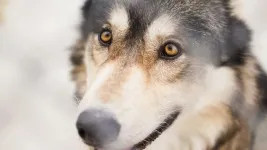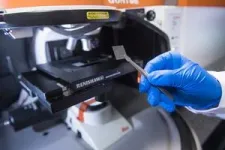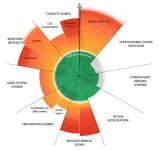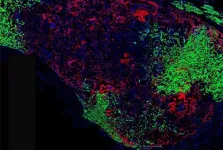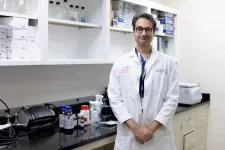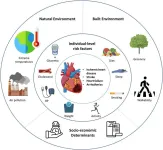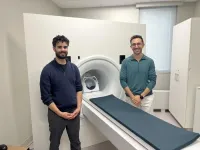(Press-News.org) In a study involving several wolves and dogs, both animals performed better at finding hidden food if they had observed the food being hidden by a person—suggesting that they remembered where the food was, and did not rely solely on scent to find it. Sebastian Vetter of the University of Veterinary Medicine Vienna, Austria, and colleagues present these findings in the open-access journal PLOS ONE on September 13.
Many species transmit important information through social learning, where one individual learns by observing or interacting with another. Prior research has suggested that wolves and dogs—who were domesticated from wolves—are capable of a form of social learning known as observational spatial memory, in which an individual can remember where another individual hid a cache of food and pilfer it. However, much remains to be learned about these abilities and how they may differ between wolves and dogs.
To shed new light, Vetter and colleagues conducted a study with 9 timber wolves and 8 mongrel dogs living at the Wolf Science Center in Ernsbrunn, Austria. They tested the ability of each animal to find 4, 6, or 8 caches of food, either after seeing a human hiding them or without the animal seeing the hiding.
The researchers found that both dogs and wolves found more of the first 5 food caches more quickly and with less distance travelled if they saw the food being hidden than if they did not see the hiding. This suggests that the animals did not just use scent in order to find the food, and it provides further support for the hypothesis that both kinds of animals are capable of observational spatial memory.
Whether or not they saw the food being hidden, wolves outperformed the dogs in finding the caches. The researchers suggest that this difference in performance may not be due to differing observational spatial memory abilities, but instead arises from differences in other traits, such as persistency and food-related motivation.
The authors add: “While domestication probably affected dogs’ willingness to adjust to humans, the results of the current study collaborate previous findings suggesting that cognitive abilities do not differ very much between dogs and wolves.”
#####
In your coverage please use this URL to provide access to the freely available article in PLOS ONE: https://journals.plos.org/plosone/article?id=10.1371/journal.pone.0290547
Citation: Vetter SG, Rangheard L, Schaidl L, Kotrschal K, Range F (2023) Observational spatial memory in wolves and dogs. PLoS ONE 18(9): e0290547. https://doi.org/10.1371/journal.pone.0290547
Author Countries: Austria
Funding: This study was partly supported by the Austrian Science Fund (Fonds zur Förderung der wissenschaftlichen Forschung, FWF), grant number P 33928-B. The funders had no role in study design, data collection and analysis, decision to publish, or preparation of the manuscript.
END
Wolves and dogs appear to remember where people hid food
However, wolves and dogs may differ in food-related motivation and persistence
2023-09-13
ELSE PRESS RELEASES FROM THIS DATE:
A trained detection dog found sea turtle nests in Florida more accurately and efficiently than humans, indicating potential for dog-assisted nest monitoring
2023-09-13
A trained detection dog found sea turtle nests in Florida more accurately and efficiently than humans, indicating potential for dog-assisted nest monitoring
###
Article URL: https://journals.plos.org/plosone/article?id=10.1371/journal.pone.0290740
Article Title: Use of a scent-detection dog for sea turtle nest monitoring of three sea turtle species in Florida
Author Countries: USA
Funding: The authors received no specific funding for this work. END ...
Six of nine planetary boundaries now exceeded
2023-09-13
A new study updates the planetary boundary framework and shows human activities are increasingly impacting the planet and, thereby, increasing the risk of triggering dramatic changes in overall Earth conditions.
For over 3 billion years, the interaction between life (represented by the planetary boundary, Biosphere Integrity) and climate have controlled the overall environmental conditions on Earth. Human activities, for example replacing nature with other land uses, changing the amount of water in rivers and in soil, the introduction of synthetic chemicals to the open environment, and the emission of greenhouse gases to the atmosphere ...
University secures £2.66M to develop personalized cancer treatment
2023-09-13
University of Liverpool researchers have secured £2.66m Medical Research Council funding to clinically test a novel immunotherapeutic strategy for non-small cell lung cancer – one of the most deadly cancers.
Professor Christian Ottensmeier, and Professor Natalia Savelyeva from the Institute of Systems, Molecular and Integrative Biology are collaborating with industry partner Genomics England and working closely with Touchlight Genetics Ltd to develop a vaccine therapy for patients with non-small cell lung cancer who have not had sufficient benefit from standard immunotherapy.
Non-small ...
Natural compound found in plants inhibits deadly fungi
2023-09-13
A new study finds that a natural compound found in many plants inhibits the growth of drug-resistant Candida fungi — including its most virulent species, Candida auris, an emerging global health threat. The journal ACS Infectious Diseases published the discovery led by scientists at Emory University.
Laboratory-dish experiments showed that the natural compound, a water-soluble tannin known as PGG, blocks 90% of the growth in four different species of Candida fungi. The researchers also discovered how PGG inhibits the growth: It grabs up iron molecules, essentially starving the fungi of an essential nutrient.
By starving the fungi rather than attacking ...
Study reveals why cancer may spread to the spine
2023-09-13
The vertebral bones that form the spine are derived from a distinct type of stem cell that secretes a protein favoring tumor metastases, according to a study led by researchers at Weill Cornell Medicine. The discovery opens up a new line of research on spinal disorders, helps explain why solid tumors so often spread to the spine, and could lead to new orthopedic and cancer treatments.
In the study, published Sept. 13 in Nature, the researchers discovered that vertebral bone is derived from ...
Research empirically shows structural discrimination negatively impacts LGB youth and adults
2023-09-13
“This study provides evidence that supports the belief of researchers and advocates that national policies protecting the human rights of lesbian, gay and bisexual people have an impact on individual development,” University of Delaware Assistant Professor Eric K. Layland said. “For LGB people, many of these identity and social milestones occur during the critical developmental period of adolescence. Results of this study add to other research showing protective policy can benefit LGB health by ...
UTHealth Houston study: Unruptured brain aneurysms may be missed in routine clinical care, but AI-powered algorithm can help
2023-09-13
Unruptured cerebral aneurysms of sizes and locations that require attention may be frequently missed in routine clinical care, but a machine learning algorithm could minimize missed care opportunities, according to a new study from UTHealth Houston.
The research, published today in Stroke: Vascular and Interventional Neurology, was led by senior author Sunil A. Sheth, MD, associate professor in the Department of Neurology with McGovern Medical School at UTHealth Houston, as well as co-first authors Hyun Woo Kim, MD, vascular and interventional neurology fellow at UTHealth Houston, and ...
Electrifying vehicles in Chicago would save lives, reduce pollution inequities
2023-09-13
If the Chicago region replaced 30% of all on-road combustion-engine vehicles — including motorcycles, passenger cars and trucks, buses, refuse trucks and short- and long-haul trucks — with electric versions, it would annually save more than 1,000 lives and over $10 billion, according to a new Northwestern University study.
The new study, which simulates air quality at a neighborhood scale, also found that areas with predominantly Black, Hispanic and Latinx residents would benefit most.
The study underscores the potential of electric vehicles (EVs) to improve ...
Noted experts present detailed evidence on the impact of environmental issues on cardiovascular health
2023-09-13
Philadelphia, September 13, 2023 – There is already robust evidence that people living with cardiovascular disease are disproportionately affected by poor air quality and extreme temperatures, in large part due to climate change, the greatest threat to human health of the 21st century. In this special theme issue of the Canadian Journal of Cardiology, published by Elsevier, noted experts comprehensively review how climate change occurs and increases the risk of cardiovascular disease and provide practical tips on how to become a climate-smart cardiovascular healthcare provider.
Not long ago, climate change was a fringe topic deemed only ...
Western researchers use AI to predict recovery after serious brain injury
2023-09-13
Two graduate students from Western University have developed a ground-breaking method for predicting which intensive care unit (ICU) patients will survive a severe brain injury.
Matthew Kolisnyk and Karnig Kazazian combined functional magnetic resonance imaging (fMRI) with state-of-the art machine learning techniques to tackle one of the most complex issues in critical care.
Whether it is the result of a stroke, cardiac arrest or traumatic brain injury, lives can forever be changed by a serious brain injury. When patients are admitted to the ICU, families are faced with tremendous uncertainty. Will my loved one recover? Are they aware of what is going on? Will they ever be the same ...
LAST 30 PRESS RELEASES:
Bacteria frozen in ancient underground ice cave found to be resistant against 10 modern antibiotics
Rhododendron-derived drugs now made by bacteria
Admissions for child maltreatment decreased during first phase of COVID-19 pandemic, but ICU admissions increased later
Power in motion: transforming energy harvesting with gyroscopes
Ketamine high NOT related to treatment success for people with alcohol problems, study finds
1 in 6 Medicare beneficiaries depend on telehealth for key medical care
Maps can encourage home radon testing in the right settings
Exploring the link between hearing loss and cognitive decline
Machine learning tool can predict serious transplant complications months earlier
Prevalence of over-the-counter and prescription medication use in the US
US child mental health care need, unmet needs, and difficulty accessing services
Incidental rotator cuff abnormalities on magnetic resonance imaging
Sensing local fibers in pancreatic tumors, cancer cells ‘choose’ to either grow or tolerate treatment
Barriers to mental health care leave many children behind, new data cautions
Cancer and inflammation: immunologic interplay, translational advances, and clinical strategies
Bioactive polyphenolic compounds and in vitro anti-degenerative property-based pharmacological propensities of some promising germplasms of Amaranthus hypochondriacus L.
AI-powered companionship: PolyU interfaculty scholar harnesses music and empathetic speech in robots to combat loneliness
Antarctica sits above Earth’s strongest “gravity hole.” Now we know how it got that way
Haircare products made with botanicals protects strands, adds shine
Enhanced pulmonary nodule detection and classification using artificial intelligence on LIDC-IDRI data
Using NBA, study finds that pay differences among top performers can erode cooperation
Korea University, Stanford University, and IESGA launch Water Sustainability Index to combat ESG greenwashing
Molecular glue discovery: large scale instead of lucky strike
Insulin resistance predictor highlights cancer connection
Explaining next-generation solar cells
Slippery ions create a smoother path to blue energy
Magnetic resonance imaging opens the door to better treatments for underdiagnosed atypical Parkinsonisms
National poll finds gaps in community preparedness for teen cardiac emergencies
One strategy to block both drug-resistant bacteria and influenza: new broad-spectrum infection prevention approach validated
Survey: 3 in 4 skip physical therapy homework, stunting progress
[Press-News.org] Wolves and dogs appear to remember where people hid foodHowever, wolves and dogs may differ in food-related motivation and persistence
